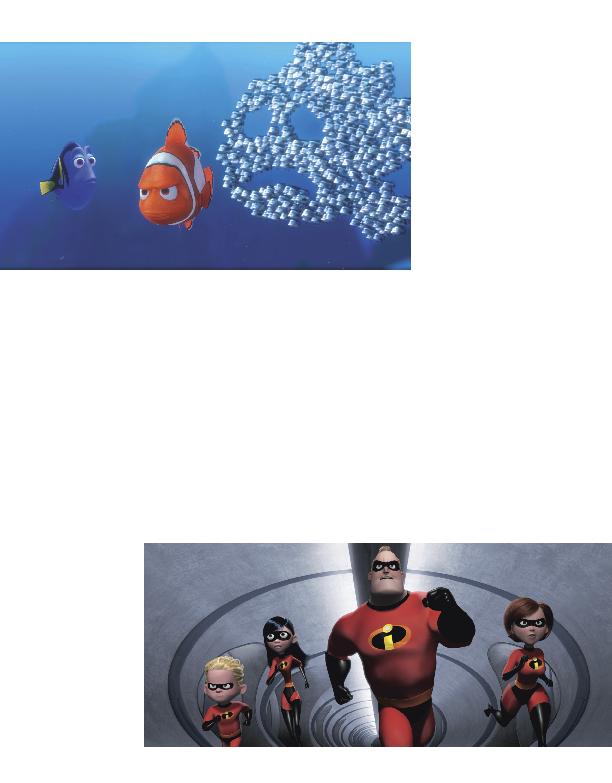
crying. And in these moments, no one's
thinking, `This is a cartoon.' No. These char-
acters are alive, they're real." Recently, the
chatter has been about Oscar-winner Up's
opening "Married Life" montage. Ultimately,
it's all about caring. As Frank Capra once said,
"The whole thing is, you've got to make them
care about somebody."
pening, but whom it is happening to. We go
to movies to see characters solve problems
and handle relationships. But what is often
forgotten is that without an emotional con-
nection to these characters, there can be no
caring about the journey these characters take.
This leads to an unsatisfying experience,
which means the movie ultimately fails.
requirement for any good
screenplay. But Pixar's sto-
rytellers do it masterfully,
which is the greatest factor
in their films' success. And
this is in spite of the extra
challenge of making us con-
nect emotionally with non-
human characters such as
toys, bugs, monsters, cars,
fish, rats and robots.
In my book, "Writing for
Emotional Impact," I pres-
ent the three areas writers
should focus on to make
pathos, humanity and admiration. Specifically,
we care about characters we feel sorry for, like
when a character is unjustly abused, aban-
doned or betrayed. We also care about char-
acters who have humanistic traits, like when
they're being nice to another human being
or animal, or when they care about a cause
or anything other than themselves. Finally,
we care about characters who have admirable
qualities. For instance, we admire characters
who are good at what they do, who are pow-
erful, attractive, charming, funny or wise.
their goals, needs and the ultimate journey
that makes up the film's plot, writers should
make us care about the characters from the
very start, preferably within the first few min-
utes of their introduction. Reading a script or
watching a film is like a dance of emotions,
anticipation, curiosity, amusement, ten-
sion and surprise. When it comes to
characters, the dance is along an empa-
thy line (I care, I like) and an enmity one
(I don't care, I dislike). This happens fast.
The moment characters are introduced,
we start building opinions about them.
Everything they say and do counts. This
is why we should create that emotional
connection as soon as possible.
for instance, Woody is upset about being
replaced by a new toy and losing Andy's
love -- a simple, honest emotional core,
and something everyone can relate to. In
Finding Nemo, a father and son are sepa-
rated. The same thing happens in Rata-
touille, as Remy is separated from his
characters are alone and we feel sorry for
them. This is Pixar's strength: Its films offer a
genuine emotional component that runs
deeper than traditional animated features.
They make sure to have a complete emotional
connection before anything else, and this is
in spite of the extra challenge of making us
connect emotionally with non-human char-
acters. Even when the film is making us care
for a cute clown fish or a family of super-
heroes, the emphasis right off the bat is to cre-
ate a moment that makes us feel sorry for the
character. In Finding Nemo, for instance, we
begin with a dark, traumatic sequence in-
volving an expectant father who loses all but
one of his 400 babies to a hungry barracuda,
which is followed by seeing his only surviv-
ing son get kidnapped by a scuba diver. And in
The Incredibles, right after the interview mon-
tage that introduces the superheroes -- and